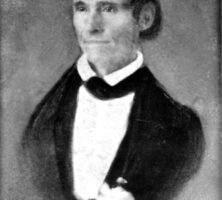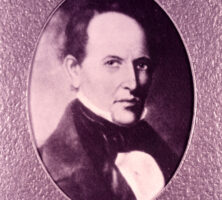Roswell King—native New Englander, manager of the Pierce Butler coastal plantations, and industrialist and businessman in Glynn and McIntosh counties—was in his seventies when he founded his namesake town, Roswell.
He established the Roswell textile mills in the late 1830s and enticed wealthy coastal families to join his enterprise, thus changing the economy and the population mix of northern Fulton County. The influence of King’s late-life accomplishments remains a part of Roswell’s historic district.

King was born in 1765 in Windsor, Connecticut, the son of Sarah Fitch and Timothy King, an accomplished weaver and a naval commander during the Revolutionary War (1775-83). Roswell settled in Darien, Georgia, when he was a young man already skilled in the construction business. He began building houses and commercial structures there and applied his expertise in the use of a regional cement-like building material called tabby, even assisting planter Thomas Spalding in the construction of his mansion on Sapelo Island.
King not only became a landowner and commission broker dealing in cotton, rice, and lumber but also served as a surveyor, justice of the peace, member of the Georgia House of Representatives, and lieutenant in the local militia. His 1792 marriage to Catherine Barrington (1776-1839) in Darien produced nine children.
Plantation Manager
Major Pierce Butler, a Philadelphia resident active in political arenas and in social circles in the North and South, was an absentee owner of vast coastal lands in Georgia; in 1802 King became the manager and overseer of Butler’s two enormous plantations, several hundred enslaved laborers, and the production of the major crops, cotton and rice.
King’s minutely detailed reports each week, his efficient record-keeping, and his productivity led Butler to entrust King with increasing authority and decision making. King persuaded Butler to introduce sugar cane production to add to the profitability of the plantation enterprises.
There was, however, constant friction between the two men over the treatment of the enslaved people. Though a strict disciplinarian, Butler was known to feed, clothe, and house his enslaved hands relatively well and to treat them fairly. King, however, was cruel and frequently punished them severely. This situation intensified after the War of 1812. Slavery problems associated with the war triggered the deterioration of the Butler-King relationship. As they had done in the Revolutionary War, British commanders again offered emancipation to fugitives from slavery who would join them. Plantation owners along the coast felt even more threatened when British admiral Sir George Cockburn and a force of Royal Colonial Marines landed on Cumberland Island and later occupied St. Simons. Butler lost 138 enslaved laborers valued at more than $60,000 to the British, who shipped them first to Bermuda and then to Halifax, Nova Scotia. Roswell King, along with plantation owners Thomas Spalding and John Couper, sailed to Bermuda in an abortive attempt to persuade the emancipated laborers to return. Butler blamed King for the loss and for his failure to realize the danger the British posed. In 1820 King resigned his position and joined the Bank of Darien as a director. His son Roswell Jr. assumed the management of the Butler plantations and remained in that capacity until 1838.
Founding of Roswell
Around 1830, while on an investigative trip for the bank to the area in north Georgia where gold had been discovered, King came upon the confluence of the Chattahoochee River and Vickery (Big) Creek, which would become part of Cobb County, and saw the power potential of the rushing waters. With his experience in the production of cotton and the sale of it to northern markets, he had long realized the economic and commercial advantages of coupling production and processing, a rare procedure in the South at that time.
After buying Cherokee Nation acreage from white winners in a land lottery, King returned in the mid-1830s to pursue his dream. Two of his sons, Barrington and Ralph, came with him to begin work on a mill complex with the help of their many enslaved laborers. Five other coastal families, including those of his daughters Catherine King Pratt and Eliza King Hand, joined him and his sons in their business endeavors and built their elegant homes.

With local farms providing most of the cotton, the Roswell Manufacturing Company was incorporated in 1839, and its cotton mill soon became the largest in north Georgia. King’s wife died in 1839, and King himself died in 1844, a decade before his namesake town of Roswell was incorporated in 1854.
With expansions and additions, the textile mills operated for more than a hundred years, and what was King’s little village grew to become one of the ten largest cities in the state. The well-planned town with its central square, mill village, church, and quaint stores—the layout and architecture influenced by his New England background—and the grand mansions of the founding families have continued to bear witness to Roswell King’s enduring legacy.








